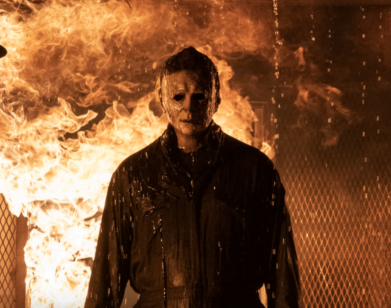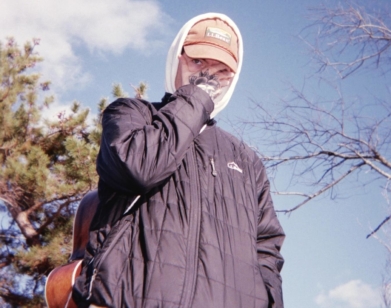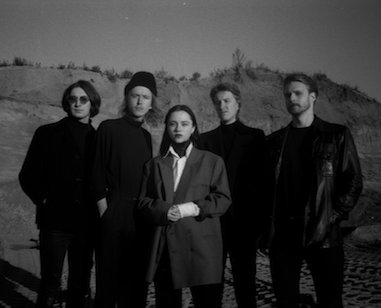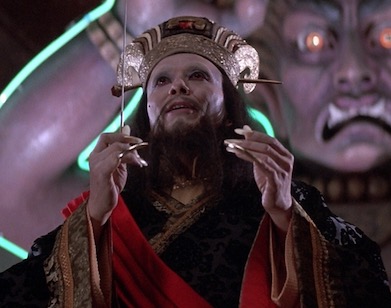What would John Carpenter want played at his funeral?
Filmmaker and composer John Carpenter has soundtracked countless deaths for slash-happy films like Halloween (1978), Escape From New York (1981) and Big Trouble In Little China (1986). As the musical genius behind 30 films, stretching over four decades, he has manufactured a sound that’s synonymous with horror. It has been facsimiled ad nauseam by lesser talents trying to get the “John Carpenter effect” in their films, but nothing can touch the monolithic tunes that prop up the spine-tingling films he has brought to the silver screen. Some of his greatest tracks from films past—the piano-heavy Halloween theme, for example—have been re-recorded for Anthology: Movie Themes 1974-1998 with the help of his son, Cody, and his godson, Daniel Davies. Giving new life to his past work was a decision made because he felt now was the time to revisit the hits.
Asked whether or not he’d change anything about his signature themes, he says, “Oh hell yes! Every second! I can’t watch my old movies. I can’t, because I’ll start watching it and I’ll think, ‘What the hell was I thinking?! Why did I do that?! That’s stupid!’ It’s just painful, so I won’t do it.”
Carpenter is in good health, ready to embark on a nationwide tour to play these songs live. To morbidly imagine the horror legend going the way of strangulation by telephone cord (such as Lynda Van Der Klok in Halloween), hit in the head with a hammer claw (Bernard Garrett in Halloween II), or decapitated with a surgical machete (Doctor Terence Wynn in Halloween: The Curse of Michael Myers) is not likely, perhaps, but if the man did slip into the night, god forbid, what songs would he want played at his funeral? Turns out, a lot of classics—none of which are horror. Why not be ushered off to what Carpenter calls the “big dark awful” with his own synth-driven classics? “I would love [the funeral attendees] to be shocked but I don’t know if they would be. They’d probably be bored! ‘Oh, that’s Carpenter!’” These are the songs that would play at the synth hero’s unpredictable wake.
SONG OF THE VOLGA BOATMEN
The first song is the “Song of the Volga Boatmen.” It’s a Russian ballad. We all know it! That’ll put everybody in the right mood. That was an old traditional song, the late 1800s I believe. A lot of people have done recordings of it. When did I first hear it? When I was a kid, everybody kind of knows this song … It’s like a funeral song. But what it really is about is Russian peasants pulling a boat down the Volga River. So it’s very sad [laughs]. I chose that song because it just puts everyone in the mood—the funeral mood! I want them to be sad at my funeral to begin with, and they don’t know what’s coming!
POP GOES THE WEASEL
That’s actually going to confuse the funeral goers for a minute, make them go, ‘What’s this about?!’ Everyone knows that song too. It is [really a shift in mood], suddenly. I want to be brutally changing moods here. I want to put the people that go to my funeral through something. The [deceased] has been through something, a transition from one place to another, so I want them all to go through it. I first heard this song when I was watching The Three Stooges. That would’ve been back in the ’50s I believe. I watched them on television and the show was very popular with kids. I watched it alone—my family wouldn’t watch it. It was déclassé!
WE’LL MEET AGAIN
“We’ll Meet Again” was made famous by the ending of [Stanley Kubrick’s] Dr. Stangelove, but it’s a British song. [sings] “We’ll meet again, don’t know where, don’t know when…” I figured that was my message to everybody: “Well, I’ll see you later.” That song has an interesting history. It was originally a 1938 British song, made famous by a singer, Vera Lynn. The two songwriters were Ross Parker and Hughie Charles. It’s the World War II song, resonated with soldiers going off to fight, to their families and their sweethearts. Yeah, it’s been in The Singing Detective in 1986 and it’s not a very good song; it’s corny and silly. [laughs]. Because it was ironic and funny. All the bombs were going off. It was a montage of the hydrogen bombs exploding and they played “We’ll Meet Again”. [Kubrick] was being horribly ironic. Horribly ironic.
MEMORIES ARE MADE OF THIS
Immediately after that, “Memories Are Made Of This,” the Dean Martin song. [sings] “Sweet, sweet memories you gave to me.” It’s just me telling them, you know what, let’s remember me for a minute. “Memories Are Made Of This” is one of his biggest hits. There are a bunch of recordings of this song. It was written in 1955 and it was Ray Conniff’s Orchestra, remember him? He was a band leader. What does he mean to me? Nothing! Absolutely nothing! The popular version of the song was recorded by Dean Martin, and I just heard it, and it’s hilariously, stupidly funny. It’s just unbelievable. But the people who recorded it, Dave King, Petula Clark, Bing Crosby, Roger Williams, Ray Conniff, The Everly Brothers, Jim Reeves, Paul Anka, Frank Sinatra recorded it. Little Richard sang it. The Drifters … The list goes on and on. It’s a completely stupid song. Absolutely stupid. I want the Dean Martin version. “The sweet sweet memories you gave of me, you can’t beat the memories you gave of me.” Oh God.
CHRIST THE LORD HAS RISEN TODAY
The last one needs no explanation. “Christ The Lord Has Risen Today.” [laughs] Is that a church song? Yeah, [sings] “Christ the Lord has risen today, ha-a-a-alle-e-lu-u-ujah.” It’s that song! When you hear it played on a big pipe organ, it is grand to hear that. So that’s how I’d like it played. A massive pipe organ. I was forced into [singing in the church choir as a child]. I went to a Methodist church. My father was choir director, so I was forced into singing in the choir. I’m not sorry I did it, it was an interesting experience. I was 12, 13, 14—somewhere in there. My dad was a music teacher. He taught music up in the university in the small town I lived in, so the church approached him to be a choir director. They needed a choir director. It was a brand new church. So he did it, my father wasn’t particularly religious, but he did it and exposed me to it and I’m glad he did. Why would I want this at my funeral? Well for ironic and ridiculous reasons: the words. I don’t know. I just want to give the funeral audience a ride. Start sad, go through a few emotions here, and walk out to “Christ Has Risen”.
ANTHOLOGY: MOVIE THEMES 1974-1998 (SACRED BONES) IS AVAILABLE OCTOBER 20, 2017.






